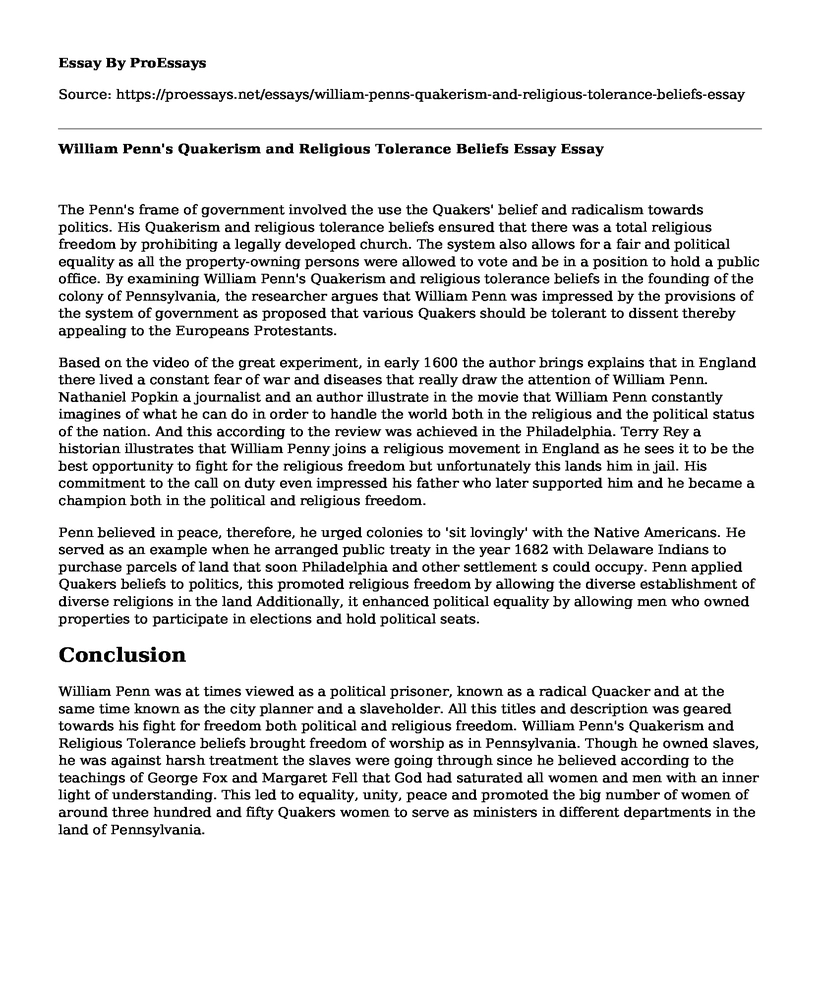The Penn's frame of government involved the use the Quakers' belief and radicalism towards politics. His Quakerism and religious tolerance beliefs ensured that there was a total religious freedom by prohibiting a legally developed church. The system also allows for a fair and political equality as all the property-owning persons were allowed to vote and be in a position to hold a public office. By examining William Penn's Quakerism and religious tolerance beliefs in the founding of the colony of Pennsylvania, the researcher argues that William Penn was impressed by the provisions of the system of government as proposed that various Quakers should be tolerant to dissent thereby appealing to the Europeans Protestants.
Based on the video of the great experiment, in early 1600 the author brings explains that in England there lived a constant fear of war and diseases that really draw the attention of William Penn. Nathaniel Popkin a journalist and an author illustrate in the movie that William Penn constantly imagines of what he can do in order to handle the world both in the religious and the political status of the nation. And this according to the review was achieved in the Philadelphia. Terry Rey a historian illustrates that William Penny joins a religious movement in England as he sees it to be the best opportunity to fight for the religious freedom but unfortunately this lands him in jail. His commitment to the call on duty even impressed his father who later supported him and he became a champion both in the political and religious freedom.
Penn believed in peace, therefore, he urged colonies to 'sit lovingly' with the Native Americans. He served as an example when he arranged public treaty in the year 1682 with Delaware Indians to purchase parcels of land that soon Philadelphia and other settlement s could occupy. Penn applied Quakers beliefs to politics, this promoted religious freedom by allowing the diverse establishment of diverse religions in the land Additionally, it enhanced political equality by allowing men who owned properties to participate in elections and hold political seats.
Conclusion
William Penn was at times viewed as a political prisoner, known as a radical Quacker and at the same time known as the city planner and a slaveholder. All this titles and description was geared towards his fight for freedom both political and religious freedom. William Penn's Quakerism and Religious Tolerance beliefs brought freedom of worship as in Pennsylvania. Though he owned slaves, he was against harsh treatment the slaves were going through since he believed according to the teachings of George Fox and Margaret Fell that God had saturated all women and men with an inner light of understanding. This led to equality, unity, peace and promoted the big number of women of around three hundred and fifty Quakers women to serve as ministers in different departments in the land of Pennsylvania.
Cite this page
William Penn's Quakerism and Religious Tolerance Beliefs Essay. (2022, Sep 04). Retrieved from https://proessays.net/essays/william-penns-quakerism-and-religious-tolerance-beliefs-essay
If you are the original author of this essay and no longer wish to have it published on the ProEssays website, please click below to request its removal:
- Essay on the Impact of Religion and Spirituality to Medical Care
- Compare and Contrast Essay on Funeral Rites of Hinduism and Christianity
- Church-Based Christian Counselling Paper Example
- Death and Dying: A Muslim Perspective - Essay Sample
- Mathew: Complementing the Synoptic Gospels & Foundation of Witness - Essay Sample
- Young Women's Christian Association: Empowering Young Women Physically, Mentally and Spiritually
- Essay Example on Christianity: Shaping Culture with Purpose and Intent







